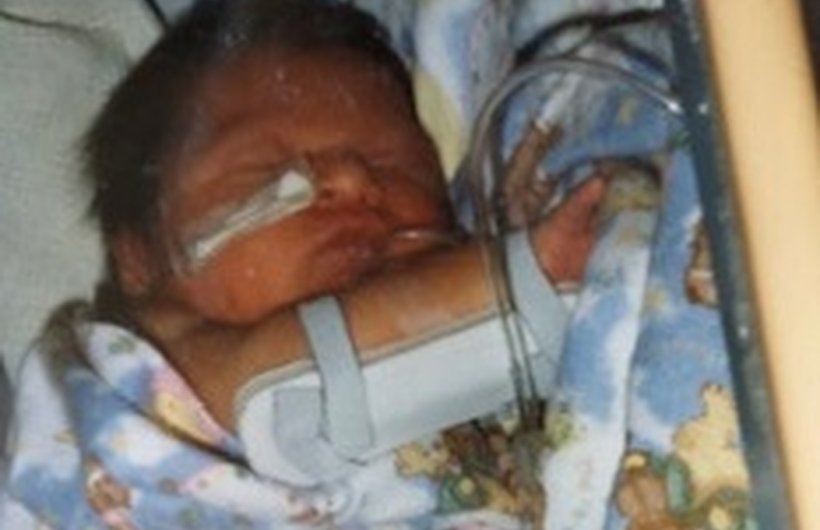

Zahra
From confronting childhood insecurities to becoming a passionate advocate for neuroblastoma survivors, Zahra’s transformative journey embodies resilience, empowerment, and hope.
Zahra was just two weeks old when her parents took her to Great Ormond Street Hospital (GOSH) and was diagnosed with infantile left adrenal neuroblastoma. She needed two types of chemotherapy during two gruelling months and then had major surgery to successfully remove the tumour in her left adrenal gland.
Now, as a young adult, Zahra reflects on her past, overcoming insecurities, and embracing a future filled with ambition and advocacy.
“I was around four or five years old when I looked at the scars on my body and I thought, ‘hold on, my siblings don’t have these so why do I have them?’”
For Zahra’s parents of course, their memory of the treatment is all too clear.
“I think it’s harder for my mum and dad to talk about it because they remember it so vividly,” reflects Zahra. “but they were strong in helping me understand from an early age what I had and how important and life-threatening it was. Because I knew this from an early age, it didn’t seem like such a big deal later in life.”
In many cases of neuroblastoma, invasive and aggressive treatment is required and, if successful, this can take its toll on the individual when they’re older.
“I’ve been told that, in the future, I might have loss of hearing and other issues because of the chemotherapy. But I’m not scared of it – no one can control everything in terms of their health."
“As a British-Pakistani, I hope sharing my story can be really beneficial, especially within the Asian community, where discussions about serious health issues often remain muted.”
Zahra Ahmad
“There’ve been no physical after-effects so far which is good. But I think the effect of it has been more mentally.”
Zahra’s insecurity around her scars led to a reluctance to talk about the origin of the scars with friends.
“I was insecure about my scars. I was scared what my friends would think. The word ‘cancer’ is so serious, and I was very shy around people with regards to it. I didn’t know how I could bring it up with friends and I just didn’t think I should talk about it and be known for my cancer, but I realised it was so much bigger in my head. Everyone has their own stuff going on.”
Zahra's perspective shifted dramatically at the age of 16 when Great Ormond Street Hospital invited her to speak about her post-treatment experience. This marked the beginning of her journey toward self-acceptance and empowerment. Zahra then shared her story with Neuroblastoma UK and received positive responses from fellow survivors forged a sense of community, breaking down the isolation that often accompanies a cancer diagnosis.
“I was insecure until I was 16. But after I wrote an article for Neuroblastoma UK and the response I received from others who have had neuroblastoma, I felt a newfound sense of belonging. It was as though I had discovered a cherished community of individuals who understood the depths of my journey.
"Beyond finding solace in our shared experiences, I also felt a deep desire to extend compassion to families who had endured the unthinkable loss of their child to cancer. This fuelled my determination to shed light on our collective struggles and advocate for those whose voices go unheard. Through empathy and understanding, I believe we can foster a community of support that uplifts every individual that have experienced this challenging journey."
Zahra developed a passion for politics as she began her A Levels and she went on to study Law at SOAS University. Despite Covid-19 hampering the student experience somewhat, Zahra graduated with honours, which she describes as a “pivotal moment”.
“On graduation day, my mum said she’d have never thought when she was with me at GOSH that we’d be here. I was so happy and proud at what I’d achieved, and I thought ‘if I can graduate in Law, what else can I do?’”

"We are so proud of Zahra. We always knew she was going to have a good life ahead of her - she is a fighter.
"To any parent going through this, don't be afraid to ask for help. Most importantly, be more forgiving to yourself. We parents tend to blame ourselves for these situations but remember it is not your fault. The doctors are looking after your child, and it is fundamental that you look after yourself and have loved ones around you.”
Naveed and Zareen, Zahra's parents
Zahra now lives in London and is training to be a solicitor, but that’s not the only goal she is setting her sights on.
“As I get older, I want to become an ambassador for neuroblastoma survivors and help people. I’m very lucky because my family were so supportive, but I know of cases where people don’t talk about their struggles or difficult experiences. If you don’t talk about it, how are you going to know there are people going through the same things?”
Looking ahead, Zahra aspires to be a beacon of hope for neuroblastoma survivors, breaking down the walls of silence and stigma.
“As a British-Pakistani, I hope sharing my story can be really beneficial, especially within the Asian community, where discussions about serious health issues often remain muted.”
Zahra's journey serves as an inspiration, illustrating that through openness, dialogue, and support, individuals can find strength in their shared experiences.
“Making an impact, even if just on an individual, is what makes me happy and makes me smile. I just want to make a difference, in whatever I do.”






